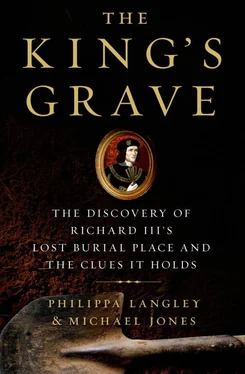There is another point. For the deaths of the two boys to be of any benefit to Richard, he had to show their bodies. Without visible proof that Edward IV’s sons were dead (of some suitable illness, of course) it would always remain open to pretenders to assume their identities and lead rebellions against Richard.
The third prince, Richard’s other nephew, Edward, Earl of Warwick, son of George, Duke of Clarence was legitimate but his father had been attainted so leaving no inheritance and certainly no claim to the throne. But attainders could be reversed by a simple Act of Parliament: the taint of illegitimacy was much more difficult to reverse. So it follows that if Richard had believed that the removal of his illegitimate nephews would secure him his throne, he would have had to remove Edward of Warwick too who was legitimate and living in the royal nursery in Richard III’s household in the north. But Richard did nothing of the kind. It was Henry Tudor who sought out and imprisoned this prince immediately after the Battle of Bosworth, eventually executing him on trumped-up charges in 1499 after he had languished in the Tower for at least twelve years.
The two independent studies I commissioned for the Looking for Richard project, to try to understand Richard’s character, both dealt with the princes and whether or not Richard killed them. The first was by master graphologist Bridget Hickey, whose findings were published in the September 2000 issue of the Ricardian Bulletin:
If there is something so provoking, so tremendous, then everyone is capable of murder, and according to their temperament would set about it differently. I cannot see him setting out, without provocation, to do harm to anybody. My gut feeling after doing this analysis, after living with this man for three weeks, is that he could not have killed the Princes in the Tower without a very good reason. He was so analytical; he would have asked so many questions, he would not act on impulse. He was not emotionally deranged. There is a side which didn’t like the business of the day – the executions etc. – but of course he would do them when it was necessary, or when he was threatened.
My second commission was the Psychological Analysis by Professor Mark Lansdale and Dr Julian Boon of the University of Leicester, which they undertook in great detail and with considerable professional interest. The result was a lengthy article in the Ricardian Bulletin of March 2013.
Their conclusions as to the likelihood of Richard having the princes put to death were contextualized within their overall psychological profile, which is summarized in Appendix 2. They were careful to review the possible necessity for the boys’ removal against the historical background of the time. Elimination of deposed kings had been done by previous monarchs, and Richard might have found himself in similar circumstances and compelled, albeit reluctantly, to follow that precedent. The key questions were why he might do so, and whether his psychology provided a clue.
As to why, this seemed problematical for two reasons: first, he may have believed his legal position as rightful king was very strong compared to theirs; and consequently he may not have seen them as a major threat. Second, at the time they were said to have disappeared he showed no sign of perceiving any serious threat from them.
As to Richard’s psychological impetus, the over-riding assessment was that he seemed to have been, above all other things, a controlled and careful person. Thus, if the princes ended up dead (however it happened), it would be out of character for him to leave the matter untidy, uncertain and unexplained. Nor would he derive any particular benefit from keeping it to himself. Looking at the alternative proposition of sending them to a secret place of safety, in such a scenario utter silence was the only way to make it work. This, they felt, was more in keeping with his personality than complicity in their death.
For me the mystery of the Princes in the Tower is crucial. For more than 500 years, Richard has been held responsible for their murder. This belief has shaped the study of both the man and his reign. If we could apply the principle of innocent until proven guilty, rather than convicting him on a balance of probabilities, it would open up serious research which may well shed new light on an ages-old mystery.
The Argument for Richard III being responsible for the deaths of the Princes in the Tower
In July 1483 the two sons of Edward IV disappeared into the inner recesses of the Tower of London. Their servants were dismissed and they were never seen again. A rebellion against Richard’s rule in October 1483, which involved a coalition of those who had previously been implacable enemies – on the one hand Lancastrians, on the other loyal members of the household of Edward IV – was clearly grounded in the conviction that the princes were no longer alive. As a result, all parties had become willing to advance the little-known Lancastrian exile, Henry Tudor, to the throne, on condition that he marry Edward IV’s eldest daughter, Elizabeth of York.
If the princes were at this stage still alive, Richard III could have quashed this conspiracy by parading them through the streets of London, a course undertaken by Henry VII in 1487 when the pretender Lambert Simnel announced that he was the Earl of Warwick, the Duke of Clarence’s son and heir. Henry Immediately produced the real Earl of Warwick – held in custody in the Tower of London – and publicly displayed him. It is telling that Richard never undertook such an action.
Richard III’s responsibility for the deaths of the princes was not fabricated by the Tudors. It was the belief of many contemporary or near-contemporary sources. It is important to say that this verdict is not unanimous – a few sources implicated the Duke of Buckingham, or confessed that the ultimate fate of the princes was not known. But the majority believed that Richard was responsible for their deaths, including Dominic Mancini, our earliest source, along with the Croyland Chronicler and other near-contemporary London or foreign chronicles. And when new accounts are unearthed they tend to substantiate the same conclusion.
Such a survey needs to be nuanced. In his main narrative, the Croyland Chronicler was circumspect, reporting the general belief by September 1483 that the princes were dead, but also making clear that no one knew exactly what had happened to them. But elsewhere the chronicler revealed his own suspicion that Richard had ‘suppressed his brother’s progeny’.
Dominic Mancini was present in London in the summer of 1483 and vividly reported the fear of many ordinary citizens for Edward V’s fate. He recalled that the subject was so distressing that some would burst into tears when considering it. Mancini gave us a remarkable window on these events and caught the contemporary mood in the capital. He also had access to one of the closest attendants of Edward V, his physician John Argentine, who was dismissed from his service in July. Argentine poignantly reported how Edward now believed his death was approaching, and had received mass and confession every day in imminent expectation of such a fate. It was a chilling testimony. Mancini was honest enough to say that when he left London at the end of July 1483 the actual fate of the princes was not known. But his clear inference that they were either dead or in immediate danger of death is all the more convincing as a result.
Mancini provides us with a contemporary account. It was based on events of the summer of 1483 he personally witnessed or reported on and thus predated the Tudor tradition. So too was the accusation that Richard had done away with his nephews, made by the French chancellor Guillaume de Rochefort to the French Estates General at Tours in January 1484. This was a remarkable comment for de Rochefort to make. He has been described as a learned and rather staid personality, and his testimony cannot be dismissed merely as an anti-English diatribe. It may have been based on specific intelligence. When the German Nicolas von Poppelau visited Richard’s court in 1484 he was also interested in the fate of the princes. Some told him candidly that they had been done away with; others that they were still being held in some safe and secret place. Poppelau chose to believe the latter – unsurprisingly perhaps, since he dined regularly with the king. But it is striking that others had been so open with him.
Читать дальше












